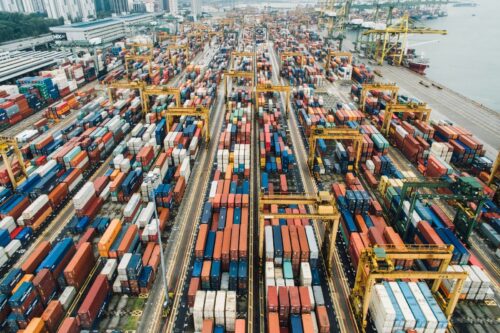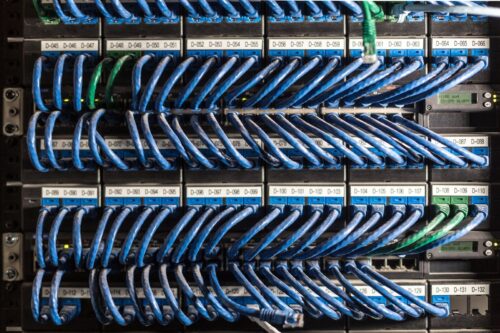Blockchain in Supply Chain: Definition, Role in Supply Chain, and Advantages

Modern advancements in logistics and supply chain operations have dramatically shifted how businesses manage the flow of goods from production to consumption. Technology innovations have paved the way for more efficient, transparent, and secure processes, fundamentally altering the landscape of global supply chains.
Blockchain technology emerges as a pivotal force at the forefront of these innovations, offering unparalleled opportunities for enhancing supply chain management.
With its decentralized ledger system, Blockchain technology brings a new dimension of transparency and security to supply chain transactions. It is a vital tool for companies looking to streamline operations and boost customer satisfaction.
Its ability to provide end-to-end visibility, verify transactions, and increase transparency across the entire supply chain revolutionizes traditional supply chains. This article aims to demystify blockchain’s role in the supply chain industry, providing a clear, accessible overview for those new to the topic.
What is Blockchain Technology, and How Does It Influence Supply Chains?
To fully grasp blockchain’s impact on supply chain management, one must first understand the essentials of blockchain technology itself. It’s a cornerstone of innovation that is gradually reshaping the foundation of supply chain networks worldwide.
Basic Concept of Blockchain
Blockchain technology is a digital ledger that records transactions across a distributed network of computers. This decentralized approach ensures that no single entity controls the entire ledger, enhancing the data’s security and integrity.
Key features of blockchain include its decentralization and immutability. Once a transaction is entered into the blockchain, altering it is nearly impossible, creating a trustworthy and transparent system for recording transactions. This immutable record is crucial for industries where verification of product authenticity and chain of custody is important.
Blockchain in the Context of Supply Chain
In supply chain management, blockchain technology offers a revolutionary approach to recording, tracking, and securing transactions and interactions. Providing a single, unalterable record of every transaction ensures transparency and trust among all parties involved in the supply chain.
From manufacturers to end consumers, every participant can verify the integrity and origin of products without relying on traditional, centralized verification forms. This capability is particularly transformative for global supply chains, where the complexity and scale of operations often introduce challenges in visibility and authenticity.
The Role of Blockchain in Supply Chain
Blockchain technology significantly elevates the transparency and efficiency of supply chain operations.
Transparency and Traceability
One of the most notable contributions of blockchain to supply chain management is its ability to enhance transparency and traceability. It offers real-time visibility into the journey of products from the manufacturer to the end-user, enabling all parties to track the movement of goods.
This level of traceability is invaluable for sectors like food safety and pharmaceuticals, where verifying the authenticity and safety of products is paramount. Blockchain’s distributed ledger ensures that every transaction and movement of goods is recorded, thus increasing transparency and building trust among consumers and supply chain partners.
Efficiency and Cost Reduction
Implementing blockchain in supply chains leads to marked improvements in efficiency and significant cost savings. By automating many processes involved in tracking and verifying goods, blockchain reduces the need for manual intervention and the potential for errors, thus speeding up transactions.
Furthermore, smart contracts — self-executing contracts with the terms directly written into code — can automatically trigger payments and updates within the supply chain, reducing the time and cost associated with traditional payment processes.
Advantages of Implementing Blockchain in Supply Chains
Implementing blockchain technology in supply chains brings many advantages, revolutionizing how businesses operate and interact with their partners and customers.
Enhanced Security
Blockchain technology significantly bolsters the security of supply chains by reducing the risk of fraud and unauthorized activities. Each transaction recorded on a blockchain is encrypted and linked to the previous transaction, creating a chain of blocks that is nearly impossible to alter.
This level of security is crucial in preventing tampering, counterfeiting, and other fraudulent activities, as altering any part of the blockchain would require consensus among all network participants.
Additionally, the decentralized nature of blockchain ensures that no single party has control over the entire chain, thereby distributing trust and further enhancing the security of supply chain transactions.
Improved Compliance and Quality Control
Blockchain’s transparency and immutability play a vital role in compliance and quality control within supply chains. It allows for creating an immutable record of the production, handling, and distribution processes, ensuring that products meet the required standards and regulations at every step.
For industries such as pharmaceuticals and food production, where safety and quality are paramount, blockchain provides a reliable means to trace the origin of raw materials and verify the authenticity of products. This traceability ensures that companies can quickly address issues, recall defective products, and maintain high-quality control standards.
Smart Contracts
Smart contracts, one of the most innovative aspects of blockchain technology, automate and enforce the execution of contract terms between parties. These self-executing contracts, with the terms of the agreement directly written into lines of code, can automatically trigger actions such as payments, notifications, or the release of goods once predefined conditions are met.
This automation reduces the need for intermediaries, accelerates the execution of agreements, and ensures that all parties adhere to the contract terms, simplifying transactions and enhancing trust among supply chain partners.
Reduced Costs and Errors
Blockchain technology significantly reduces administrative and operational costs associated with traditional supply chain management by streamlining processes and eliminating the need for intermediaries. Automating contracts and transactions minimizes human intervention, reducing the likelihood of errors and delays.
Moreover, the enhanced transparency and accuracy of blockchain-based systems can reduce the costs of audits, compliance, and dispute resolution, as all parties have access to a single, immutable version of the truth regarding supply chain transactions.
Improved Inventory Management
Blockchain technology provides unparalleled visibility and control over inventory management. With real-time updates and an accurate record of goods as they move through the supply chain, companies can optimize their inventory levels, reducing the risk of overstocking or stockouts.
This real-time visibility also enables companies to respond swiftly to demand spikes or supply chain disruptions, ensuring they can adjust their inventory and production plans to meet market demands efficiently.
Improved inventory management leads to better resource allocation, reduced storage costs, and increased customer satisfaction, as businesses can more reliably meet delivery times and product availability expectations.
Challenges and Considerations
While blockchain presents transformative opportunities for supply chains, it also introduces challenges and considerations that businesses must navigate to harness its full potential.
Technical Challenges and Integration
Integrating blockchain technology into existing supply chain systems presents technical challenges. The novel nature of blockchain means that many organizations lack the in-house expertise necessary for seamless integration.
Ensuring compatibility between blockchain platforms and legacy systems is essential, but it can be complex and requires substantial time and investment. Additionally, the performance and scalability of blockchain solutions must align with the demands of global supply chains, which handle vast amounts of data and transactions daily.
Overcoming these technical hurdles is crucial for companies aiming to successfully implement blockchain technology and reap its benefits in supply chain management.
Regulatory and Scalability Issues
Regulatory compliance emerges as a significant challenge when adopting blockchain in supply chains. Blockchain networks’ decentralized and global nature often crosses multiple legal jurisdictions, making compliance with all applicable laws and regulations complex.
Furthermore, as the technology is relatively new, regulatory frameworks specific to blockchain use in supply chains are still developing, leading to uncertainties that can hinder adoption. Scalability also poses a concern; as more companies adopt blockchain, the platforms must be able to support an increasing number of transactions without compromising speed or security.
Addressing these regulatory and scalability issues is vital for the widespread adoption of blockchain in supply chain management. This will ensure that businesses can operate efficiently and legally on a global scale.
Industry Examples of Blockchain Use

Across multiple sectors, blockchain technology is revolutionizing supply chain management by enhancing transparency, efficiency, and security.
- Pharmaceuticals: Blockchain ensures the integrity of the supply chain, enabling pharmaceutical companies to verify the authenticity of drugs and combat counterfeiting. It provides an immutable record of pharmaceutical production, distribution, and handling, ensuring compliance with health regulations and safety standards.
- Food and Agriculture: In the food industry, blockchain offers end-to-end visibility from farm to table, improving food safety and traceability. It enables food producers and retailers to quickly trace the origin of produce in the event of a food safety scare, ensuring the rapid removal of contaminated products from the supply chain.
- Manufacturing: Blockchain technology streamlines the manufacturing supply chain by providing real-time visibility into the movement of goods and materials. It reduces delays and increases efficiency, allowing manufacturers to respond swiftly to demand spikes and supply chain disruptions.
- Mining: In the mining industry, blockchain facilitates ethical sourcing by tracking the origin of raw materials. It ensures that materials such as diamonds and minerals are sourced responsibly and ethically, providing transparency to consumers and reducing the risk of purchasing conflict minerals.
These examples underscore blockchain’s versatility and capacity to address various industries’ unique challenges.
By offering a transparent, secure, and efficient way to track and manage supply chain activities, blockchain technology sets a new standard for supply chain management, driving improvements in customer satisfaction, operational efficiency, and ethical practices.
Frequently Asked Questions (FAQ)
Below are answers to some commonly asked questions about integrating blockchain technology within supply chains.
Is there a role for blockchain in responsible supply chains?
Absolutely. Blockchain technology is pivotal in creating responsible supply chains by enhancing transparency and traceability. It enables all parties involved—from producers to consumers—to verify the ethical sourcing and authenticity of products.
Which blockchain is best for supply chains?
The “best” blockchain for supply chains depends on specific needs, such as scalability, transaction speed, and interoperability with existing systems. Platforms like IBM Food Trust and Ethereum offer robust frameworks for supply chain applications, each with unique features suited to different aspects of supply chain management.
How is blockchain used in logistics?
In logistics, blockchain technology is used to streamline operations and enhance transparency. It provides real-time visibility into the movement of goods, enabling more efficient management of the supply chain network.
How does blockchain save money for supply chains?
Blockchain saves money for supply chains by increasing efficiency and reducing the need for intermediaries. Automated smart contracts cut down on administrative costs and speed up transactions. At the same time, blockchain-based systems’ enhanced transparency and accuracy reduce losses from counterfeit goods, fraud, and compliance penalties.
How does blockchain enhance ethical sourcing?
Blockchain’s transparent and immutable records provide undeniable proof of ethical sourcing, allowing consumers and companies to verify the authenticity of products and the ethical nature of their production.
What impact does blockchain have on supply chain efficiency?
Blockchain’s distributed ledger technology drastically enhances supply chain efficiency by streamlining transactions, reducing manual processes, and ensuring secure, immediate communication among parties. Integrating blockchain with artificial intelligence optimizes logistics, minimizes delays, and enhances operational efficiency.
How do blockchain and artificial intelligence together drive innovation in supply chains?
Integrating Blockchain and artificial intelligence (AI) significantly advances supply chain efficiency by combining blockchain’s increased transparency and secure, distributed nature with AI’s analytical prowess and predictive capabilities.
AI algorithms optimize logistics and forecast demand to reduce waste and carbon emissions, while blockchain ensures data integrity and facilitates secure, transparent payment processes.
Conclusion
We’ve delved into how blockchain revolutionizes supply chains by enhancing transparency, security, and efficiency while addressing costs and ethical sourcing challenges. Its adoption across food, pharmaceutical, and automotive industries highlights its capability to streamline operations and foster customer trust.
The continuous evolution of logistics technologies, including blockchain, underscores the importance of staying informed for supply chain leaders. Understanding blockchain’s role in supply chain management is crucial for leveraging its benefits effectively.
This guide aims to provide you with the knowledge needed to navigate the complexities of blockchain adoption, empowering you to enhance your supply chain operations in today’s fast-paced business world. Blockchain is more than a trend; it’s a transformative force reshaping the supply chain landscape.

